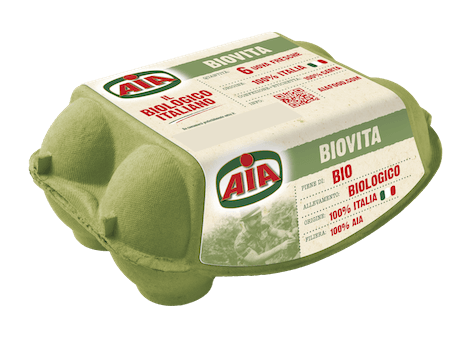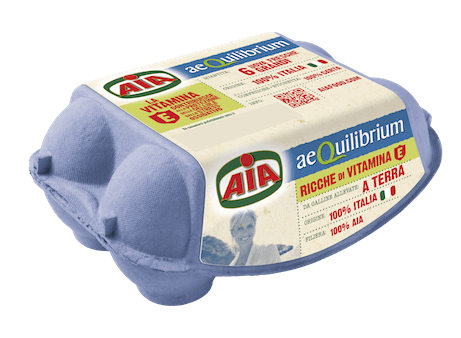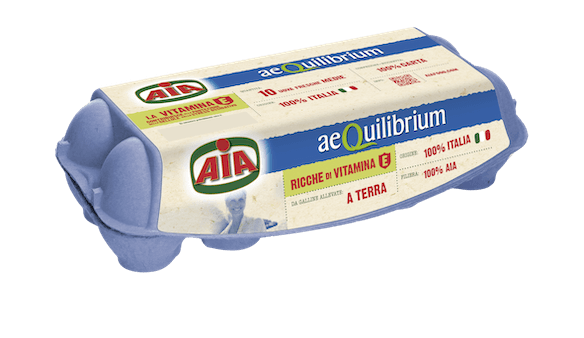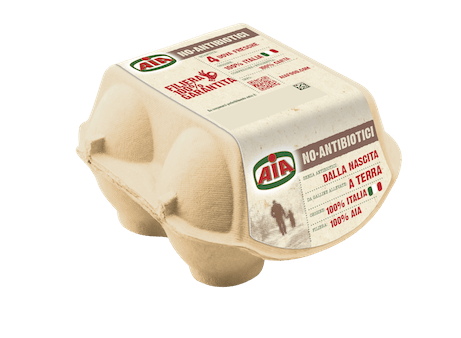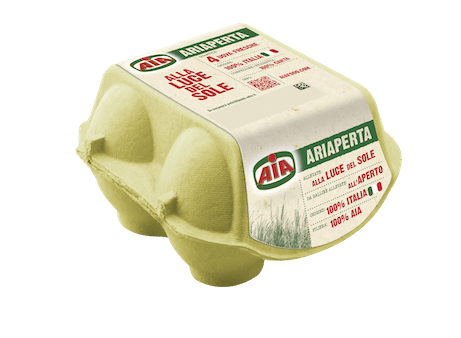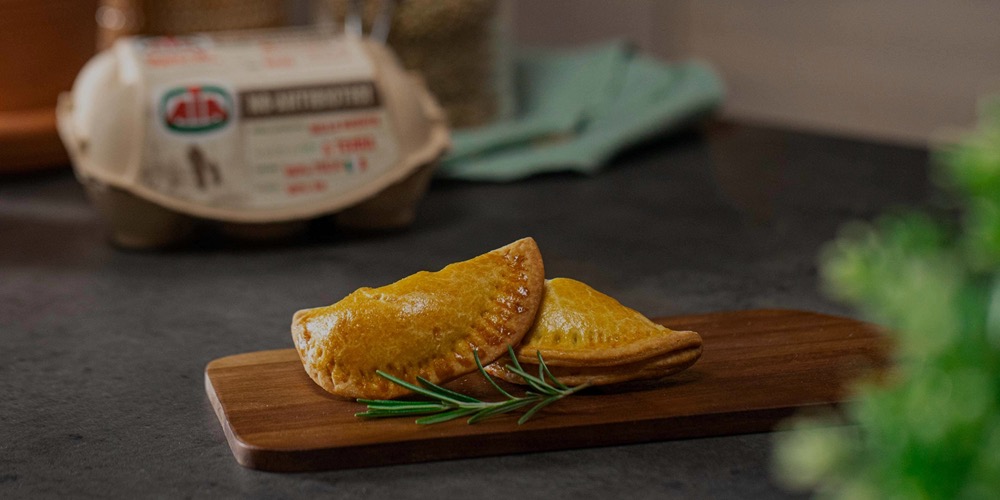Eggs

aeQuilibrium
Vitamin E helps to protect cells from oxidative stress
As part of a balanced diet and a healthy lifestyle, two of these hard-boiled eggs (boiled for 7 minutes) provide 36% of the daily requirement of vitamin E.
How long does it take to be cooked?
-
 Poached
15 min
Poached
15 min
-
 Hard-boiled
9 min
Hard-boiled
9 min
-
 Soft-boiled
3 min
Soft-boiled
3 min
-
 Sunny-side-up
5 min
Sunny-side-up
5 min
-
 Scrambled
5 min
Scrambled
5 min
Nutrition facts
| Quantity per 100 g | Percentage | |
|---|---|---|
| ENERGY | 526kJ/126kcal | 6% |
| Fat | 8,7g | 12% |
| of which saturated fat acids | 3,2g | 16% |
| CARBS | 0g | 0% |
| of which sugar | 0g | 0% |
| PROTEIN | 12g | 24% |
| SALT | 0,34g | 6% |
*Daily reference intakes of an average adult (8400kJ/2000kcal)
Pasta gialla
Add color to your recipes!
How long does it take to be cooked?
-
 Poached
15 min
Poached
15 min
-
 Hard-boiled
9 min
Hard-boiled
9 min
-
 Soft-boiled
3 min
Soft-boiled
3 min
-
 Sunny-side-up
5 min
Sunny-side-up
5 min
-
 Scrambled
5 min
Scrambled
5 min
Nutrition facts
| Quantity per 100 g | Percentage | |
|---|---|---|
| ENERGY | 526kJ/126kcal | 6% |
| Fat | 8,7g | 12% |
| of which saturated fat acids | 3,2g | 16% |
| CARBS | 0g | 0% |
| of which sugar | 0g | 0% |
| PROTEIN | 12g | 24% |
| SALT | 0,34g | 6% |
*Daily reference intakes of an average adult (8400kJ/2000kcal)
aeQuilibrium
Rich of Omega 3
Omega 3s are a group of polyunsaturated fatty acids. Among these, there is DHA which contributes to normal heart and brain functions. 100g of our aeQuilibrium eggs provide about 140mg of DHA, equal to 56% of the daily amount (250mg) to be taken in order to obtain beneficial effects, as part of a balanced diet and a healthy lifestyle.
How long does it take to be cooked?
-
 Poached
15 min
Poached
15 min
-
 Hard-boiled
9 min
Hard-boiled
9 min
-
 Soft-boiled
3 min
Soft-boiled
3 min
-
 Sunny-side-up
5 min
Sunny-side-up
5 min
-
 Scrambled
5 min
Scrambled
5 min
Nutrition facts
| Quantity per 100 g | Percentage | |
|---|---|---|
| ENERGY | 573kJ/138kcal | 6% |
| Fat | 9,5g | 12% |
| of which saturated fat acids | 3,0g | 16% |
| di cui acidi grassi monoinsaturi | 4,0g | |
| di cui acidi grassi polinsaturi | 4,0g | |
| CARBS | 1,0g | 0% |
| of which sugar | 0g | 0% |
| PROTEIN | 12g | 24% |
| SALT | 0,43g | 6% |
| Acidi grassi Omega3 | 400mg | |
| di cui DHA | 140mg |
*Daily reference intakes of an average adult (8400kJ/2000kcal)
Biovita
100% guaranteed Supply chain
How long does it take to be cooked?
-
 Poached
15 min
Poached
15 min
-
 Hard-boiled
9 min
Hard-boiled
9 min
-
 Soft-boiled
3 min
Soft-boiled
3 min
-
 Sunny-side-up
5 min
Sunny-side-up
5 min
-
 Scrambled
5 min
Scrambled
5 min
Nutrition facts
| Quantity per 100 g | Percentage | |
|---|---|---|
| ENERGY | 526kJ/126kcal | 6% |
| Fat | 8,7g | 12% |
| of which saturated fat acids | 3,2g | 16% |
| CARBS | 0g | 0% |
| of which sugar | 0g | 0% |
| PROTEIN | 12g | 24% |
| SALT | 0,34g | 6% |
*Daily reference intakes of an average adult (8400kJ/2000kcal)
Antibiotic-free
100% guaranteed Supply chain
How long does it take to be cooked?
-
 Poached
15 min
Poached
15 min
-
 Hard-boiled
9 min
Hard-boiled
9 min
-
 Soft-boiled
3 min
Soft-boiled
3 min
-
 Sunny-side-up
5 min
Sunny-side-up
5 min
-
 Scrambled
5 min
Scrambled
5 min
Nutrition facts
| Quantity per 100 g | Percentage | |
|---|---|---|
| ENERGY | 526kJ/126kcal | 6% |
| Fat | 8,7g | 12% |
| of which saturated fat acids | 3,2g | 16% |
| CARBS | 0g | 0% |
| of which sugar | 0g | 0% |
| PROTEIN | 12g | 24% |
| SALT | 0,34g | 6% |
*Daily reference intakes of an average adult (8400kJ/2000kcal)
Ariaperta
Eggs reared in the sunlight
How long does it take to be cooked?
-
 Poached
15 min
Poached
15 min
-
 Hard-boiled
9 min
Hard-boiled
9 min
-
 Soft-boiled
3 min
Soft-boiled
3 min
-
 Sunny-side-up
5 min
Sunny-side-up
5 min
-
 Scrambled
5 min
Scrambled
5 min
Nutrition facts
| Quantity per 100 g | Percentage | |
|---|---|---|
| ENERGY | 526kJ/126kcal | 6% |
| Fat | 8,7g | 12% |
| of which saturated fat acids | 3,2g | 16% |
| CARBS | 0g | 0% |
| of which sugar | 0g | 0% |
| PROTEIN | 12g | 24% |
| SALT | 0,34g | 6% |
*Daily reference intakes of an average adult (8400kJ/2000kcal)
Cook with AIA
A fragile shell that contains a precious, tasty and nutritious treasure: egg is the key ingredient for many traditional recipes. Let's take a trip across the Italian regions, at the tables where a party for the whole family starts with a simple egg.

Pasta Gialla
Free-range eggs ideal for kneadingLigurian scents
Torta Pasqualina
Did you know that?
A savory cake of Genoese origin, The Pasqualina cake has been known since the 16th century. Making it meant glorifying the culinary skills of the housewives, who had to be able to layer thirty-three sheets of pastry, to pay homage to the years of Christ.
Apulia
Scarcelle
Did you know that?
The Apulian scarcella - a sweet donut made for Easter - is one of the symbols of rebirth. The quantity of eggs used for the recipe depended on the class of the family that made it: 3 eggs for the rich and only 1 for the poorest.
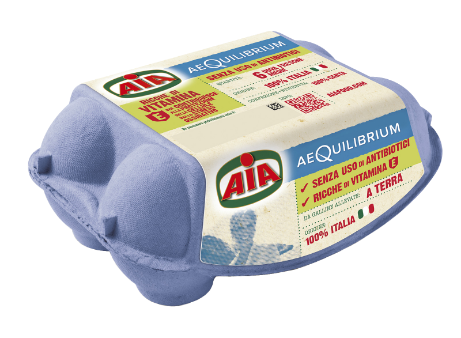
Vitamin E
Free-range eggs, high in vitamin ESardinia
Pardulas
Did you know that?
These sweet baskets of pasta filled with sheep's milk ricotta were prepared by Sardinian shepherds on the occasion of Easter. Made with simple and genuine ingredients, pardulas still retain all the taste of the past.

Aria Aperta
Eggs reared in the sunlight
Antibiotics-free
Free-range and antibiotics-free eggsAbruzzo and Molise
Fiadone
Did you know that?
During the Easter period, these delicious little bundles – typical of the culinary tradition of Abruzzo and Molise – have strips of pasta arranged in a cross, to symbolize the cross of Jesus.
Eggs: properties, cooking methods, curiosities and recipes

Our products



